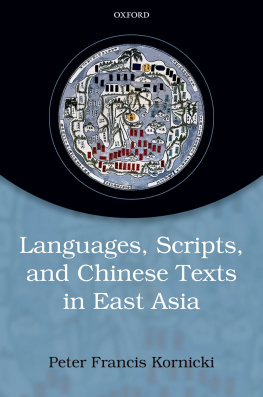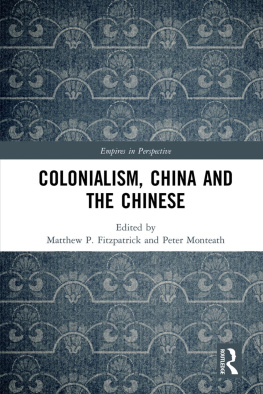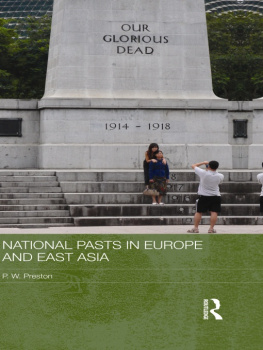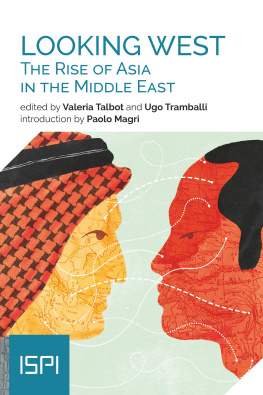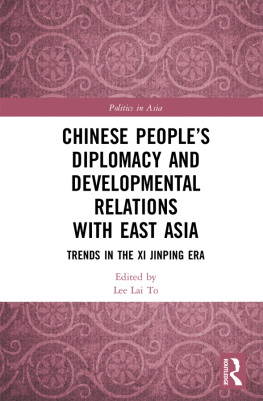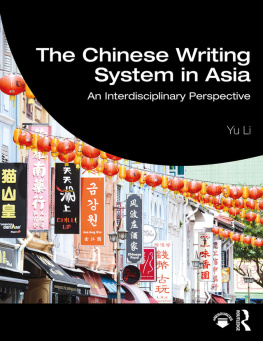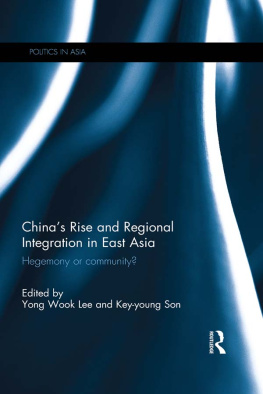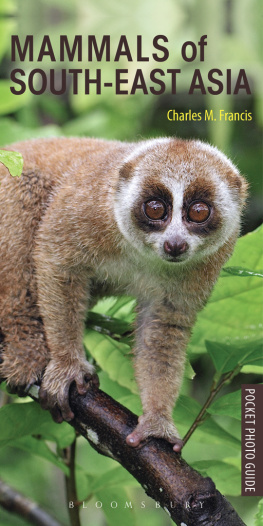Peter Francis Kornicki - Chinese Writing and the Rise of the Vernacular in East Asia
Here you can read online Peter Francis Kornicki - Chinese Writing and the Rise of the Vernacular in East Asia full text of the book (entire story) in english for free. Download pdf and epub, get meaning, cover and reviews about this ebook. City: Oxford, year: 2018, publisher: Oxford University Press, genre: Religion. Description of the work, (preface) as well as reviews are available. Best literature library LitArk.com created for fans of good reading and offers a wide selection of genres:
Romance novel
Science fiction
Adventure
Detective
Science
History
Home and family
Prose
Art
Politics
Computer
Non-fiction
Religion
Business
Children
Humor
Choose a favorite category and find really read worthwhile books. Enjoy immersion in the world of imagination, feel the emotions of the characters or learn something new for yourself, make an fascinating discovery.
- Book:Chinese Writing and the Rise of the Vernacular in East Asia
- Author:
- Publisher:Oxford University Press
- Genre:
- Year:2018
- City:Oxford
- Rating:4 / 5
- Favourites:Add to favourites
- Your mark:
- 80
- 1
- 2
- 3
- 4
- 5
Chinese Writing and the Rise of the Vernacular in East Asia: summary, description and annotation
We offer to read an annotation, description, summary or preface (depends on what the author of the book "Chinese Writing and the Rise of the Vernacular in East Asia" wrote himself). If you haven't found the necessary information about the book — write in the comments, we will try to find it.
Chinese Writing and the Rise of the Vernacular in East Asia — read online for free the complete book (whole text) full work
Below is the text of the book, divided by pages. System saving the place of the last page read, allows you to conveniently read the book "Chinese Writing and the Rise of the Vernacular in East Asia" online for free, without having to search again every time where you left off. Put a bookmark, and you can go to the page where you finished reading at any time.
Font size:
Interval:
Bookmark:


Great Clarendon Street, Oxford, OX2 6DP, United Kingdom
Oxford University Press is a department of the University of Oxford. It furthers the Universitys objective of excellence in research, scholarship, and education by publishing worldwide. Oxford is a registered trade mark of Oxford University Press in the UK and in certain other countries
Peter Francis Kornicki 2018
The moral rights of the author have been asserted
First Edition published in 2018
Impression: 1
All rights reserved. No part of this publication may be reproduced, stored in a retrieval system, or transmitted, in any form or by any means, without the prior permission in writing of Oxford University Press, or as expressly permitted by law, by licence or under terms agreed with the appropriate reprographics rights organization. Enquiries concerning reproduction outside the scope of the above should be sent to the Rights Department, Oxford University Press, at the address above
You must not circulate this work in any other form and you must impose this same condition on any acquirer
Published in the United States of America by Oxford University Press 198 Madison Avenue, New York, NY 10016, United States of America
British Library Cataloguing in Publication Data
Data available
Library of Congress Control Number: 2017947593
ISBN 9780198797821
ebook ISBN 9780192518699
Printed and bound by CPI Group (UK) Ltd, Croydon, CR0 4YY
Links to third party websites are provided by Oxford in good faith and for information only. Oxford disclaims any responsibility for the materials contained in any third party website referenced in this work.
All under the heavens use the same writing
(Doctrine of the mean)
Dedicated with love to my parents:
Franciszek Kornicki
(18 December 191616 November 2017)
Patience Ceridwen Kornicka
(31 August 192326 November 2017)
This book has its origins in the fourteenth annual conference of SHARP, the Society for the History of Authorship, Reading, and Publishing, which was held in The Hague and Leiden in July 2006. The organizers of the conference invited me to give one of the three keynote lectures and in doing so to address the conference theme, which highlighted the importance of the European and the North American heritage for the book and print cultures of the world. They expected me to demonstrate how important European books had been for Japan. Churlishly enough, I pointed out how absurd this expectation was, given that Chinese books and texts had been far more important to Japan than European books for most of the last two thousand years. Therefore, I said, I could only speak in such a way as to undermine the theme. Kindly overlooking my tactless response, the organizers accepted that my approach would be different. In my lecture, it seemed to me best to demonstrate the role that Chinese books had played not only in Japan but also in Korea and Vietnam as well, to make it clear that I was not making a parochial point about Japan alone. This forced me to revive my rusty Korean in a hurry and to make my first trip to Hanoi, early in 2006. Thus, it is no exaggeration to say that I am first and foremost indebted to the organizers of the SHARP conference, without whom I would never have embarked on this ambitious and apparently endless enquiry, and to one of my fellow speakers, Robert Darnton, who encouraged me to pursue the topic.
I have been fortunate enough to have had many opportunities to develop my ideas and to benefit from advice, correction, and friendly criticism ever since that conference in Leiden. In March 2008, I developed my arguments at much greater length in the Sandars Lectures at the University Library, Cambridge, which were later made available online in an annotated version. Subsequently I have taken the arguments further at conferences, workshops, or lectures at (in chronological order) Hangzhou, Nishgakusha University (Tokyo), the University of Venice Ca Foscari, the Academy of Korean Studies (Seoul), Barnard College (New York), Columbia University, Princeton University, the Royal Asiatic Society Korea Branch, the Collge de France, Oberlin College, Yale University, the Asan Institute (Seoul), Brown University, Harvard University, Leiden University, the cole pratique des hautes tudes (Paris), the Biblioteca Ambrosiana (Milan), Cornell University, the Vietnam Academy of Social Sciences (Hanoi), Rice University (Houston), and Ohio State University (Columbus). To the participants on all these occasions, in most cases far more expert than me, I am greatly indebted for gentle correction, generous advice, and lively discussion.
As is obvious, the geographical area and chronological scope covered by this book are impossibly broad for one person to master. I have made up for my lack of expertise by drawing upon a wide spectrum of secondary literature, particularly in Chinese, Japanese, Korean, and English. This necessarily brings with it some distortion, for there are vast secondary literatures in Chinese and Japanese, somewhat less large in Korean although growing rapidly, and still rather small in Vietnamese. As a result, Japan and Korea figure rather more fully in this book than Vietnam, which I regret.
As far as possible, however, I have tried to base this book upon the evidence furnished by manuscripts and early printed books in literary Chinese and other languages which were produced in various parts of East Asia. I have been unusually dependent upon the inestimable goodwill of countless librarians from New York to Seoul and from Hanoi to Tokyo who have put aside their own work to provide unstinting help and good advice. In Britain, the University Library at Cambridge has been an indispensable home-base, especially the Aston Collection of early Japanese books and the Wade Collection of Chinese books, and I am deeply indebted to Noboru Koyama and Charles Aylmer for their astute librarianship over many years. Elsewhere, the antiquarian and modern collections of the British Library, the Bodleian Library in Oxford, and the library of the School of Oriental and African Studies in London have been particularly valuable. Professor Naganuma Ken of Dshisha University has on several occasions kindly provided me with scans of articles inaccessible in Britain.
All research trips cost money, and to those who provided it I am grateful beyond measure: the Japan Foundation, the Leverhulme Trust, the Japan Foundation Endowment Committee, the University of Cambridge, Robinson College (Cambridge), and the Association for South East Asian Studies UK. To the Warden and Fellows of Robinson College, Cambridge, I am deeply grateful for permission to absent myself from my duties as Deputy Warden of the College for nine months in 2010 and on various other occasions.
This book is in many ways the culmination of more than thirty years of work, and it certainly would not have been within my capabilities to undertake it much earlier. Nor would it have been possible had I not revived my undergraduate Korean in a hurry with the connivance of my Cambridge colleagues, Mark Morris and John Nilsson-Wright, and had I not found a Japanese-speaking colleague in Hanoi, Nguy n Th Oanh, to guide my first encounters with Vietnamese books.
Apart from those already mentioned, I owe particular thanks to Peter Fox, then University Librarian at Cambridge, who invited me to give the Sandars Lectures in 2008. I have benefited enormously from the advice and opinions of Peter Burke, Anne Cheng, Wiebke Denecke, Benjamin Elman, Joshua Fogel, Simon Franklin, Imre Galambos, Ross King, Rainier Lanselle, David Lurie, Sven Osterkamp, Shang Wei, Haruo Shirane, Brian Steininger, Roel Sterckx, Daniel Trambaiolo, Thorsten Traulsen, John Tucker, Sem Vermeersch, and a former graduate student, Rebekah Clements. In addition, Wim Boot, Richard Bowring, Joshua Fogel, Clive Holes, Kate Wildman Nakai, Jonathan Silk, and Keith Taylor were kind enough to read chapters or parts and to give me the benefit of their expert knowledge. Imre Galambos, Barend ter Haar, Ross King, and my wife, Francesca Orsini, laboured through the whole manuscript and it has benefited enormously from their comments and criticisms: I am deeply and humbly grateful. In the final stages of revision I had the huge good fortune to enjoy the stimulating company of Linda Chance, Roger Chartier, Julie Nelson Davis, Lynne Farrington, John Pollack, and Peter Stallybrass at the University of Pennsylvania. Francesca has lived with this book for ten years and has nurtured it with encouragement, constructive criticism, and love.
Font size:
Interval:
Bookmark:
Similar books «Chinese Writing and the Rise of the Vernacular in East Asia»
Look at similar books to Chinese Writing and the Rise of the Vernacular in East Asia. We have selected literature similar in name and meaning in the hope of providing readers with more options to find new, interesting, not yet read works.
Discussion, reviews of the book Chinese Writing and the Rise of the Vernacular in East Asia and just readers' own opinions. Leave your comments, write what you think about the work, its meaning or the main characters. Specify what exactly you liked and what you didn't like, and why you think so.

